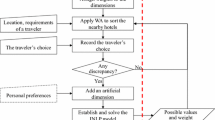Abstract
To further increase the successful recommendation rate of a ubiquitous hotel recommendation system, an incremental learning and integer-nonlinear programming approach (INLP) is proposed in this study to mine users’ unknown preferences. In the proposed methodology, an INLP problem is solved to adjust the values of weights in the recommendation mechanism to be closer to those in the decision-making mechanism so as to maximize the successful recommendation rate. In addition, the weights are adjusted on a rolling basis so that more historical data can be considered without inflating the INLP model. The experimental results showed that the proposed methodology outperformed several existing methods in increasing the successful recommendation rate, even with a cold start.






Similar content being viewed by others
References
Adomavicius G, Tuzhilin A (2011) Context-aware recommender systems. Recommender systems handbook. Springer, Amsterdam, pp 217–253
Arruza M, Pericich J, Straka M (2016) The automated travel agent: hotel recommendations using machine learning. http://cs229.stanford.edu/proj2016spr/report/017.pdf
Campbell DL (2016) Measurement matters: productivity-adjusted weighted average relative price indices. J Int Money Finance 61:45–81
Chen T (2017) Ubiquitous clinic recommendation by predicting a patient’s preferences. Electron Commerce Res Appl 23:14–23
Chen T, Chuang YH (2018) Fuzzy and nonlinear programming approach for optimizing the performance of ubiquitous hotel recommendation. J Ambient Intell Human Comput 9(2):275–284
Chen T, Tsai HR (2018) Application of industrial engineering concepts and techniques to ambient intelligence: a case study. J Ambient Intell Human Comput 9(2):215–223
García-Crespo Á, López-Cuadrado JL, Colomo-Palacios R, González-Carrasco I, Ruiz-Mezcua B (2011) Sem-Fit: a semantic based expert system to provide recommendations in the tourism domain. Expert Syst Appl 38(10):13310–13319
Gelper S, Fried R, Croux C (2010) Robust forecasting with exponential and Holt–Winters smoothing. J Forecast 29(3):285–300
Jung KY (2006) User preference through learning user profile for ubiquitous recommendation systems. In: Gabrys B, Howlett RJ, Jain LC (eds) Knowledge-based intelligent information and engineering systems, KES 2006. Lecture notes in computer science, vol 4251. Springer, Berlin, Heidelberg, pp 163–170
Khalid O, Khan MUS, Khan SU, Zomaya AY (2014) Omnisuggest: a ubiquitous cloud-based context-aware recommendation system for mobile social networks. IEEE Trans Serv Comput 7(3):401–414
Konstan JA, Riedl J (2012) Recommender systems: from algorithms to user experience. User Model User Adap Interact 22(1):101–123
Lee JS, Lee JC (2007) Context awareness by case-based reasoning in a music recommendation system. In: Ichikawa H, Cho WD, Satoh I, Youn HY (eds) International symposium on ubiquitious computing systems, Lecture notes in computer science, vol 4836. Springer, Berlin, Heidelberg, pp 45–58
Levi A, Mokryn O, Diot C, Taft N (2012) Finding a needle in a haystack of reviews: cold start context-based hotel recommender system. In: Proceedings of the sixth ACM conference on recommender systems. ACM, New York, pp 115–122
Lin KP, Lai CY, Chen PC, Hwang SY (2015) Personalized hotel recommendation using text mining and mobile browsing tracking. In: IEEE international conference on systems, man, and cybernetics, pp 191–196
Liu HC, You JX, Lin QL, Li H (2015a) Risk assessment in system FMEA combining fuzzy weighted average with fuzzy decision-making trial and evaluation laboratory. Int J Comput Integr Manuf 28(7):701–714
Liu S, Ogata H, Mouri K (2015b) Accelerate location-based context learning for second language learning using ubiquitous learning log. In: Emerging issues in smart learning. Springer, Berlin, pp 53–60
Mettouris C, Papadopoulos GA (2014) Ubiquitous recommender systems. Computing 96(3):223–257
Schafer JB, Frankowski D, Herlocker J, Sen S (2007) Collaborative filtering recommender systems. The adaptive web. Springer, Berlin, pp 291–324
Xiao J, Wang M, Jiang B, Li J (2018) A personalized recommendation system with combinational algorithm for online learning. J Ambient Intell Human Comput 9(3):667–677
Zhang H, Wang Z, Gulliver TA (2018) Two-stage weighted centroid localization for large-scale wireless sensor networks in ambient intelligence environment. J Ambient Intell Human Comput 9(3):617–627
Acknowledgements
This study was sponsored by the Ministry of Science and Technology, Taiwan.
Author information
Authors and Affiliations
Corresponding author
Additional information
Publisher’s Note
Springer Nature remains neutral with regard to jurisdictional claims in published maps and institutional affiliations.
Rights and permissions
About this article
Cite this article
Chen, TC.T., Wang, YC. An incremental learning and integer-nonlinear programming approach to mining users’ unknown preferences for ubiquitous hotel recommendation. J Ambient Intell Human Comput 10, 2771–2780 (2019). https://doi.org/10.1007/s12652-018-0986-x
Received:
Accepted:
Published:
Issue Date:
DOI: https://doi.org/10.1007/s12652-018-0986-x




